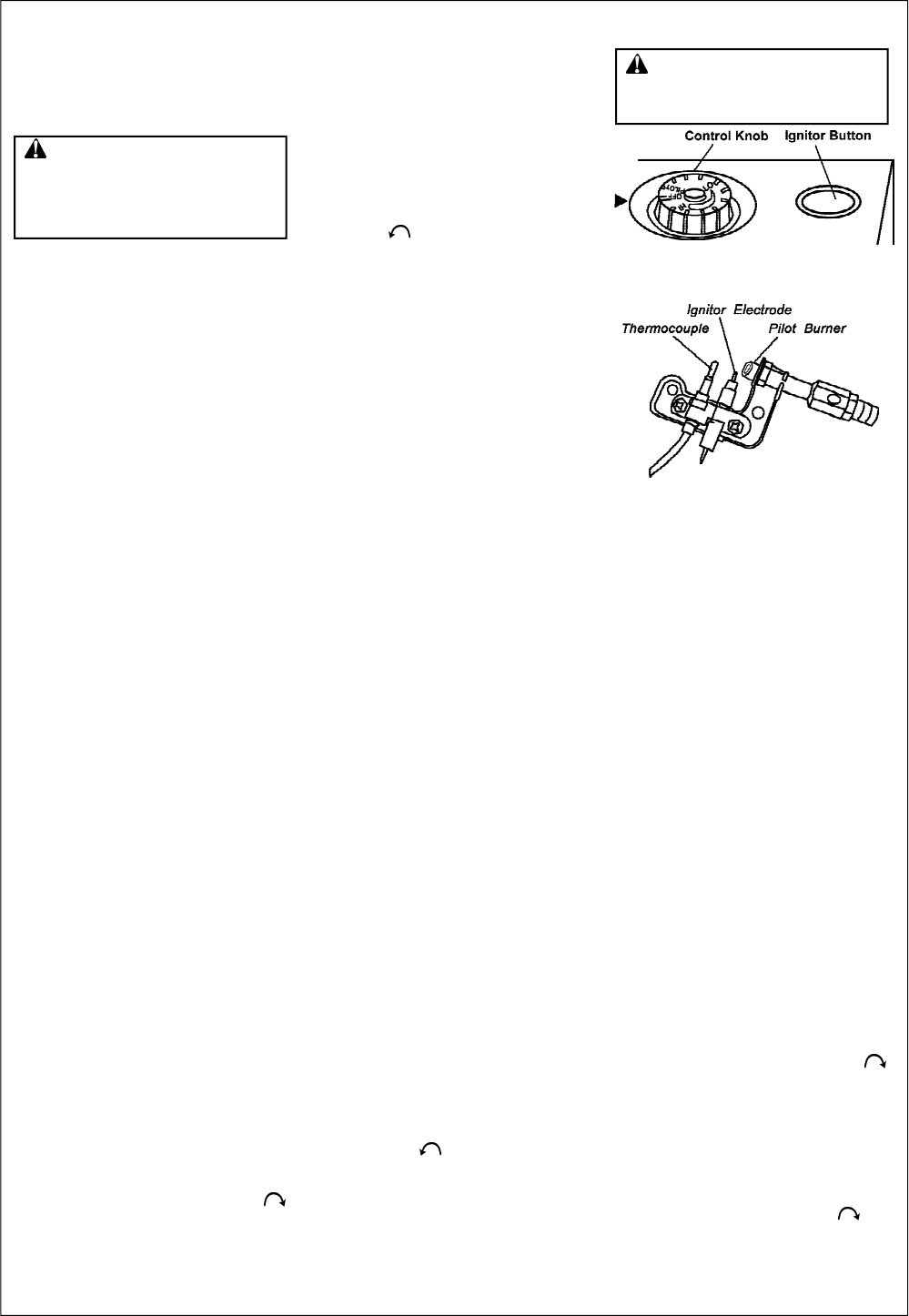
12
OPERATING YOUR HEATER
nFOR YOUR SAFETYn
READ BEFORE LIGHTING
A. When lighting the pilot, follow
these instructions exactly.
B. BEFORE LIGHTING smell all
around the appliance area for gas.
Be sure to smell next to the floor
because some gas is heavier than
air and will settle on the floor.
WHAT TO DO IF YOU SMELL GAS
l Do not try to light any appliance.
l Do not touch any electric
switch, do not use any phone
in your building.
l Immediately call your gas
supplier from a neighbor’s
phone. Follow the gas
supplier’s instructions.
l If you cannot reach your gas
supplier, call the fire department.
C. Use only your hand to push
in or turn the gas control knob.
Never use tools. If the knob will
not push in or turn by hand, don’t
try to repair it , call a qualified
service technician or gas supplier.
Force or attempted repair may
result in a fire or explosion.
D. Do not use this appliance if
any part has been under water.
Immediately call a qualified service
technician to inspect the appliance
and to replace any part of the control
system and any gas control which
has been under water.
nLIGHTINGn
INSTRUCTIONS
WARNING: If you do not follow
these instructions exactly, a fire or
explosion may result causing
property damage, personal injury
or loss of life.
1. STOP! Read the safety
information on the side of heater.
2. Make sure equipment shutoff
valve is fully open.
3. Turn control knob clockwise
to the OFF position.
4. Wait five(5) minutes to clear
out any gas. Then smell for gas,
including near the floor. If you
smell gas, STOP! Follow “B” in the
safety information on the side of
heater. If you don’t smell
gas, go to the next step.
5. Turn control knob counterclock-
wise to the PILOT position.
Press in control knob for five(5)
seconds. (see Figure18).
Note: You may be running
this heater for the first time
after hooking up to gas supply.
If so, the control knob may
need to be pressed in for 30
seconds. This will allow air to
bleed from the gas system.
l If control knob does not pop
up when released, contact a
qualified service person or
gas supplier for repairs.
6. With control knob pressed in,
push down and release ignitor
button. This will light pilot. The
pilot is attached to the front of
burner. The pilot can be seen
through the glass panel. If
needed, keep pressing ignitor
button until pilot lights.
Note: If pilot does not stay lit, refer
to Troubleshooting, pages 14 through
16. Also contact a qualified service
person or gas supplier for repairs.
Until repairs are made, light pilot with
match.To light pilot with match, see
Manual Lighting Procedure.
7. Keep control knob pressed
in for 30 seconds after lighting
pilot. After 30 seconds, release
control knob.
l If control knob does not pop
up when released, contact a quali-
fied service person or gas
supplier for repairs.
Note: If pilot goes out,repeat steps 3
through 7.This heater has a safety
interlock system. Wait one(1)
minute before lighting pilot again.
8. Turn control knob counter-
clockwise to desired heating
level. The main burner should
light. Set control knob to any
heat level between HI and LO.
nTO TURN OFF GASn
TO APPLIANCE
Shutting Off Heater
1. Turn control knob clockwise
to the OFF position.
2. Turn off all electric power to the
appliance if service is to
be performed.
Shutting Off Burner Only (pilot
stays lit )
Turn control knob clockwise to
the PILOT position.
Figure 18 - Control Knob in The
OFF Position
Figure 19 - Pilot
CAUTION: Do not try to ad-
just heating levels by using the
equipment shutoff valve.
nTHERMOSTAT CONTROL OPERATIONn
The thermostatic control used on this
model differs from standard
thermostats.Standard thermostats
simply turn on and off the burner. The
thermostat used on this heater senses
the room temperature. At times the
room may exceed the set temperature.
If so,the burner will shut off. The burner
will cycle back on when room tempera-
ture drops below the set temperature.
The control knob can be set to any com-
fort level between HI and LO.
Note: The thermostat sensing bulb mea-
sures the temperature of air near the
heater cabinet.This may not always agree
with room temperature(depending on
housing construction, installation location,
room size, open air temperatures,etc.)
Frequent use of your heater will let you
determine your own comfort levels.
THERMOSTAT MODEL


















